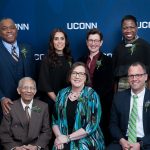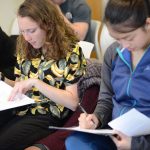Students of color in UConn’s Neag School of Education are fortunate that their predecessors established an organization called Leadership in Diversity.
Almost five years ago, students formed the group to build a support system for future teachers of color at the university. It’s a mentoring program intended to give students the tools and networks that will enable them to succeed in their careers as educators.
According to research over the years, gifted identification is closely tied to income and race. Students from low-income families and students who are black or Latino are much less likely to be identified as gifted than more-affluent students and white or Asian students. “The key factor is poverty, to be honest,” said Del Siegle, a University of Connecticut professor in gifted education and director of the National Center for Research on Gifted Education. The groups that are likewise underrepresented in schools’ gifted programs — minorities and English language learners — often share the issues of poverty.
In addition, according to a study by Joshua Hyman, an assistant professor at the University of Connecticut, the test also uncovered low-income students who might have otherwise not applied to college: about 480 for every 1,000 who had taken the test before 2007 and had scored well.
The players, the years and the victories have rolled by, and on Tuesday the present-day Huskies presented Jim Penders with his 500th as UConn’s coach, a 4-0 victory at Boston College behind the pitching of Jeff Kersten.
This past Saint Patrick’s Day, members of the Neag School of Education Alumni Board; Neag School faculty, staff, and administrators; friends of the University; and families gathered around tables draped in purple in the Rome Ballroom of the University of Connecticut’s Storrs campus to celebrate the achievements of seven Neag School alumni during the 20th annual Neag School of Education Alumni Awards Celebration.
A former UConn student-athlete, Clewiston Challenger ’03 (CLAS), ’08 MA now serves as assistant professor of counseling in the Neag School. This latest installment of “10 Questions” connects with Challenger on his experiences as a UConn undergrad, his current research, and his aspirations for the students he now teaches in the counseling program.
The Neag School of Education, the UConn Department of English, and the Connecticut Writing Project (CWP) at UConn are proud to announce Connecticut’s winners of the 25th annual Letters About Literature competition, a nationwide contest sponsored by the Library of Congress for students in grades 4 through 12.
“My name is Lara Hawley and I am currently serving as a Fulbright English Teaching Assistant in South Africa for nine months,” says Lara Hawley. “I arrived in January and will be here until October. This first month in South Africa has been a whirlwind, but I have loved every single second of it!”
“Teacher preparedness has been the focus of a great deal of (at times) impassioned debate in the last thirty years,” says Dr. Suzanne Wilson, Neag Endowed Professor of Teacher Education at the University of Connecticut and Chair of Curriculum and Instruction in the Neag School. “The teacher workforce is the largest profession in the U.S.; preparing close to four million teachers to be high quality is challenging.”
Betsy McCoach, Professor of Measurement, Evaluation, and Assessment program in the Department of Educational Psychology discusses how students in poverty are less likely to be identified as gifted.



